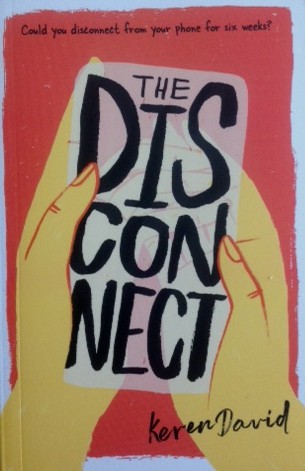Inspiring Young Readers
 posted on 12 May 2019
posted on 12 May 2019
The Disconnect by Keren David
Could this novel be any more prescient or pressing? At a time when there is plenty of public debate about the impact of social media on young people in particular; about, so-called cyber-bullying; and about whether telephone use is addictive, the story of Esther and her friends has particular resonance.
When a seemingly eccentric mobile phone entrepreneur turns up at Esther’s school and offers the pupils the chance to win £1000 if they will give up using their telephones for six whole weeks, the school is positively buzzing. For Esther this is the chance to get the money together to visit her dad and her sister who now live in America.
But, in truth, Esther’s life hasn’t really been going so well just recently. Her mom and her new partner have opened a café that’s not doing brilliantly (partly because of a malicious review posted online) and she’s finding that she’s become a bit of a slave to her online friendship groups who aren’t always as kind and supportive as they might be. Perhaps the chance to disconnect for a while would be a good thing?
In the end plenty of those who register interest at the beginning of the project soon drop out because they can’t stand the thought of being out of the digital loop and a small group of those determined to stay the course emerges. None of them are finding it easy – especially Esther – and the thought of packing it all in or cheating is always in her mind.
But despite all the hardships, the disconnect is enabling something interesting to happen – new face-to-face friendships are being forged, old friendships are being re-evaluated, there are encounters with fake news and the digital and real world are finding a new balance.
It’s sometimes hard for people from my generation (by which I mean those of us who have lived longer without digital technology than with it) to recognise that younger people are now constantly connected to someone or something and that this puts a unique pressure on them.
While the message of this book is clear enough, its real strength is that it’s not preachy. Keren David appreciates just how central social networks are to the lives of so many teenagers today and this story isn’t just some kind of utopian appeal for them to give up their phones and go back to an analogue world. But we tend to forget that digital technologies are still a very recent social reality that we are struggling to come to terms with. There’s lots of very good reasons to embrace these new modes of interaction but that’s not a reason to let go of the more traditional real-world face-to-face relationships that can be so fulfilling. The answer, as exemplified in this story, lies in finding out how both of these worlds can live side by side and how we can select the best from both of them.
The book comes in the Barrington Stoke Teen series and has the usual qualities of design and presentation to help make them as accessible as possible to readers who might otherwise be reluctant to pick up a novel and read for pleasure.
Highly recommended.
Terry Potter
May 2019